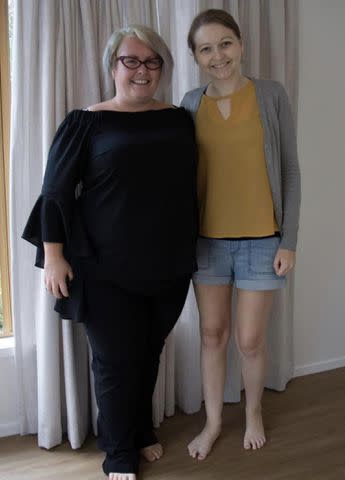Woman, 33, Dies of Genetic Disorder a Doctor Said She Was Faking
Stephanie Aston, who had Ehlers-Danlos Syndrome, was denied medical care after a doctor said she was causing her symptoms

Ehlers-Danlos Syndromes New Zealand Facebook
Stephanie Aston.Stephanie Aston, 33, died at her New Zealand home on September 1 after a public battle with Ehlers-Danlos Syndrome (EDS) — a genetic disorder she was accused of faking.
The misdiagnosis severely impacted her medical care, and fellow New Zealanders with EDS believe that if she hadn’t been prevented from receiving proper care for her illness, she would still be alive.
An advocate for invisible illnesses, Aston started speaking out in 2018 after a doctor said instead of EDS, she had "Factitious Disorder,” the New Zealand Herald reports.
Previously known as Munchausen’s, the Mayo Clinic describes Factitious Disorder as “is a serious mental disorder in which someone deceives others by appearing sick, by purposely getting sick or by self-injury.”

Ehlers-Danlos Syndromes New Zealand Facebook
Stephanie Aston (right) with a member of the New Zealand EDS community.Never miss a story — sign up for PEOPLE's free daily newsletter to stay up-to-date on the best of what PEOPLE has to offer, from juicy celebrity news to compelling human interest stories.
But Aston was suffering from EDS, a genetic disorder that members of her family also had. Although EDS generally affects connective tissue — like joints and blood vessel walls — the vascular type, which Aston was thought to have had, is a more serious form of the syndrome that the Mayo Clinic says can “cause the walls of your blood vessels, intestines or uterus to rupture.”
In a complaint to the Auckland District Health Board, Aston laid out how the misdiagnosis from the doctor — called Doctor A in reports — negatively impacted treatment for her anemia.
"I feel like I have had my dignity stripped and my rights seriously breached," Aston said at the time, according to The Herald. "Due to my extremely low hemoglobin levels, my specialist feels I am at serious risk of dying."
However, Aston’s anemia was deemed self-inflicted.
"I was told because I had been a midwife I must be stealing needles from the hospital and bleeding myself through my vagina, my bowel or my throat," she told The Herald.
Instead of medical intervention, Aston was forcibly admitted to the hospital under psychiatric watch.
"I wasn't even allowed to go to the toilet or bathroom by myself," she told The Herald.
Those in New Zealand’s EDS community said they are ready to fight against medical mistreatment in Aston’s name.
“It has been a silent struggle for so many of us and, with Steph’s passing, I think so many of us are ready to fight. It’s what she would’ve wanted,” Norma Hockenhull, who has EDS, told The Herald.
Related: Doctor Who Devised a Treatment for Her Rare, Painful Disease Started Clinic to Help Others
“There are no words to accurately describe how I felt watching this all unfold,” Hockenhull said. “You are never prepared to see someone you care about die, especially at such a young age."
“Steph was an accomplished young woman who had her whole life in front of her. With early intervention and a comprehensive medical team, I believe she would still be here. She would’ve had a chance.”
For more People news, make sure to sign up for our newsletter!
Read the original article on People.

